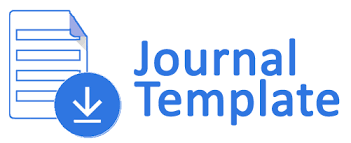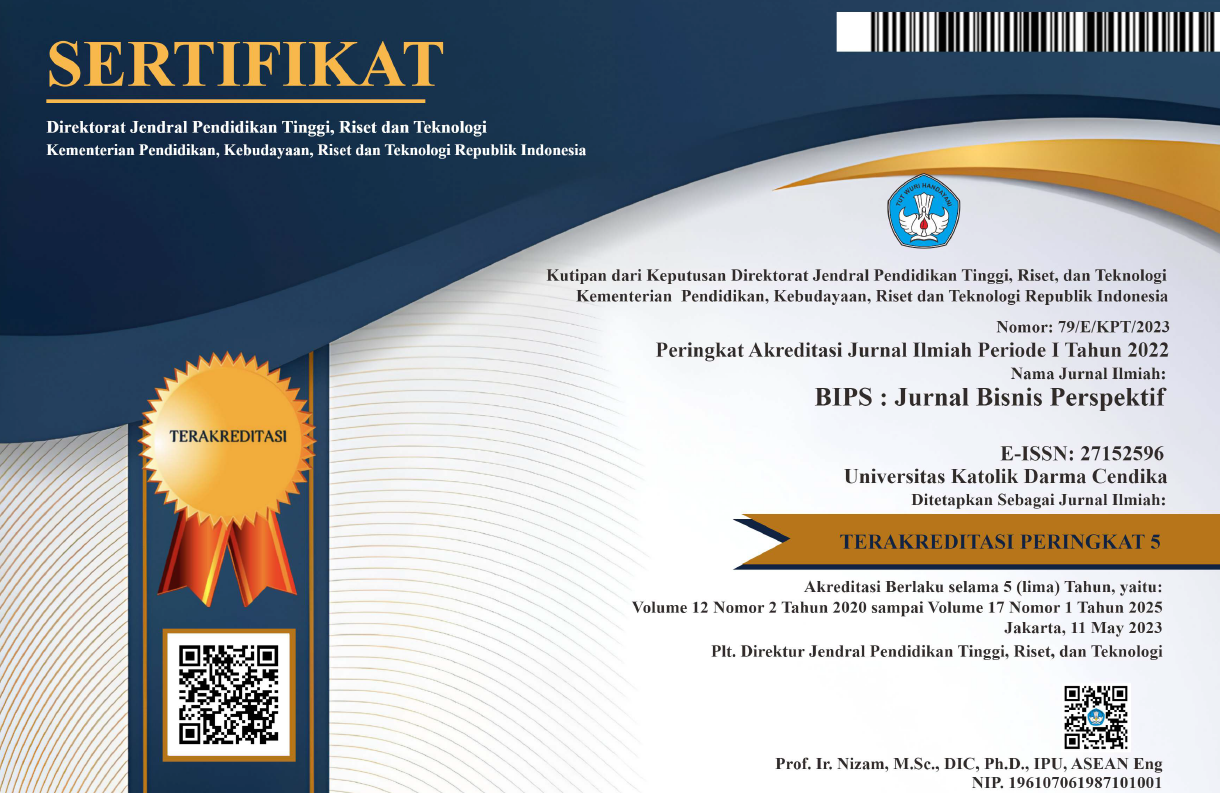Publication Ethics
Publication Ethics and Malpractice Statement
This statement describes the ethical behavior of all parties involved in publishing articles in BIP'S : Journal of Business Perspectives, including authors, editorial board, bestarial partners, and publisher. This statement is based on COPE's Best Practice Guidelines for Journal Editors.
Publishing Code of Conduct
Publishing articles in BIP'S: Journal of Business Perspectives is an important building block in the development of a coherent and respected knowledge network. It is a direct reflection of the quality of the work of the authors and the institutions that support them. The articles reviewed support and embody the scientific method. It is therefore important to agree on the standards of ethical behavior expected of all parties involved in publishing, viz: authors, journal editors, reviewers, publishers, and the public.
The Faculty of Economics of Darma Cendika Catholic University Surabaya is responsible for overseeing all stages of publishing in a conscientious manner and recognizes its ethical and other responsibilities. The institution is not only committed to ensuring that reprint advertisements and other commercial income have no impact or influence on editorial decisions, but is also committed to assisting communication with journal managers and/or other publishers if deemed useful and necessary.
Publishing Decision
The editor of BIP'S: Journal of Business Perspectives is responsible for deciding whether submitted articles should be published. The validity of the work and its importance to researchers and readers should always drive the decision. Editors may be guided by the policies of the journal's editorial board and constrained by legal requirements as they apply to defamation, copyright infringement, and plagiarism. Editors may confer with other editors or the review team in making these decisions.
Plagiarism
Authors should submit only original work that is not plagiarized, and has not been published or being considered elsewhere. Turnitin software may be used by the editorial office to check for similarities of submitted manuscripts with existing literature. Inclusion of fraudulent or knowingly inaccurate statements are unacceptable. Work and/or words from other publications must be appropriately cited or quoted.
Fair Treatment
The editors always evaluate manuscripts based on their intellectual content without discriminating against the race, gender, sexual orientation, religious beliefs, ethnic origin, nationality or political philosophy of the authors.
Confidentiality
Editors and editorial staff should not disclose any information about a submitted manuscript to anyone other than the authors, expert editors, bestarial partners, and publisher.
Disclosure and Conflict of Interest
Unpublished materials disclosed in the submitted manuscript may not be used in the editor's own research without the express written consent of the authors.
Ethics for Editors
- Editors are responsible for the material quality of articles received
- Editors guide reviewers and writers in the articles received
- Editors are responsible for the confidentiality of peer reviewers
- Editors adhere to the principle of justice or non-discrimination against all articles received.
- Editors must prepare guidelines for all members of the editorial board.
- Editors avoid conflicts of interest of all stakeholders involved during the publishing process.
Ethics for Authors
- Authors are responsible for plagiarism and copyright infringement or other intellectual property rights on the submitted text.
- Authors must ensure that articles submitted are not being considered or accepted for publication in another journal.
- The names of the authors show who did the research and / or wrote the article.
- All authors must approve the submission of the article to the Jurnal Bisnis Perskeptif (BIP's) and give a mandate to the main author to sign the IPR form.
- If a fatal error occurs in an article published, the author must notify the editor or publisher to follow up.
Ethics for Reviewers
- Reviewers must act objectively and independently.
- Reviewers provide constructive input so that articles become worthy of publication.
- Reviewers immediately notify the editor if the article sent is indicative of plagiarism.
- During the publishing process, reviewers avoid conflicts of interest and confidentiality of an article.
- During the publishing process, reviewers must refer to Jurnal Bisnis Perskeptif (BIP's) guidelines.
Assessment Team Obligations
Contribution to Editorial Decisions
Reviewers' judgments help editors make editorial decisions and through editorial communication with authors can also help authors improve their writing.
- Speed
Any selected reviewer who feels unqualified to assess the research reported in a manuscript or knows that a prompt review will be impossible should inform the editor and excuse himself or herself from the review process. - Confidentiality
Any manuscript accepted for review should be treated as a confidential document. It should not be shown or discussed with others unless authorized by the editor. - Objectivity Standard
Appraisal should be done objectively. Personal criticism of the author is not allowed. Reviewers should state their views clearly with supporting arguments. - Acknowledgement of Sources
Assessors must identify relevant published works not cited by the authors. Any assertion that an observation, derivation, or argument has been previously reported must be accompanied by the relevant citation. A reviewer should also ask the editor to note any similarities or overlaps between the manuscript under review and other published work. - Notification and Conflict of Interest
Confidential information or opinions obtained through peer review should be kept confidential and should not be used for personal gain. Reviewers should not consider manuscripts in which they have a conflict of interest stemming from a competitive, cooperative, or other relationship or connection with any author, company, or institution associated with the paper.
Author Obligations
- Reporting Standards
Authors must present an accurate account of the work created and an objective discussion of its significance. Key data must be accurately represented in the paper. A paper should include sufficient detail and references to allow others to repeat the work. Fraudulent or intentionally inaccurate statements are unethical and unacceptable behavior. - Originality and Plagiarism
Authors must ensure that they have written entirely original works, and that they have properly cited if they use the work and/or words of others. - Multiple, Repetitive or Concurrent Publishing
An author should generally not publish a manuscript describing essentially the same research in more than one major journal or publication. Submitting the same manuscript to more than one journal simultaneously is unethical and unacceptable behavior. - Acknowledgment of Sources
Reasonable acknowledgment of the work of others should always be given. Authors should cite publications that were influential in determining the nature of the reported work. - Authorship of the paper
Authorship should be limited to those who made a substantial contribution to the conception, design, execution or interpretation of the reported study. All persons who made significant contributions should be listed as co-authors. If others participated in certain key aspects of the research project, they should be acknowledged or listed as contributors. The corresponding author should ensure that all appropriate co-authors are included in the paper, and that all co-authors have seen and approved the final version of the paper and have agreed to its submission for publication. - Notification and Conflicts of Interest
All authors must disclose in their manuscript any financial or other substantive conflicts that might be expected to influence the outcome or interpretation of their manuscript. All financial support for the project must be disclosed. - Fundamental errors in published works
If an author discovers significant errors or inaccuracies in their published work, it is the author's obligation to immediately notify the journal editor or publisher and work with the editor to retract or correct the paper.



6.png)
2.png)


